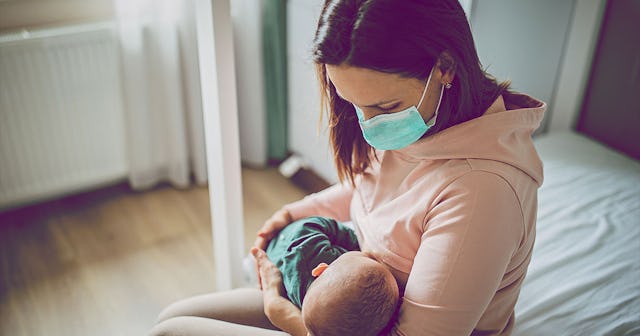What To Know About Pregnancy, Breastfeeding, And The COVID-19 Vaccine

With the first doses of the COVID-19 vaccine now in the hands (or, should we say, arms) of Americans, some are beginning to breathe a sigh of relief. After all, the vaccine — developed by Pfizer Inc. and BioNTech SE — is approximately 95 percent effective. That means there is hope. Potential. There may actually be an end to this crisis in sight. However, not everyone can take the vaccine. The inoculation was not approved for use in children, for example, and while those who have had a severe allergic reaction to a vaccine or injectable therapy may be inoculated, they should proceed with caution. But where does that leave pregnant people?
Here’s everything we know about pregnancy, breastfeeding, and the COVID-19 vaccine.
Can those who are pregnant receive the COVID-19 vaccine?
The COVID vaccine has not yet been tested in pregnant people. In fact, they were specifically excluded from Pfizer’s clinical trials — and all of the trials thus far. Why? Well, because in general, drug and vaccine makers are reluctant to include pregnant individuals in these studies for fear of injuring the developing fetus and/or threatening the pregnancy. That said, there is hope.
The Society of Maternal Fetal Medicine and the American College of Obstetrics and Gynecology both support the vaccine. The Centers for Disease Control and Prevention believes the decision can (and should) be made circumstantially. Pregnant people should speak with their healthcare provider regarding the pros and cons, and Dr. Peter Klatsky, the co-founder of Spring Fertility, tells Scary Mommy that (so far) the benefits appear to outweigh the risks: “Given the molecular makeup of the virus, the risk of fetal harm is low.”
Plus, by time the vaccine is available to the general public, more information should be available.
How about those who are nursing? Can the virus be transmitted to your toddler or infant?
Pierre Ogeron/Getty
While it seems unlikely the COVID-19 vaccine will negatively impact those who are breastfeeding or nursing, the truth is we don’t yet know. Pfizer didn’t test the vaccine in expectant or lactating individuals. However, according to Klatsky, the risk is low.
“Since individuals who were and/or are infected with the virus have continued to breastfeed and there have not been any transmissions to date, we can therefore extrapolate that the vaccine is probably safe,” says Klatsky. What’s more, there’s a good chance the vaccine will be beneficial, for the nursing parent and child.
“Much like other vaccines… it is likely that the COVID-19 vaccine will boost the mother’s immunity to develop antibodies against the virus which she can share with her child through breast milk,” Dr. Gan Eng Cern — a physician in Edinburgh, United Kingdom — tells Scary Mommy.
Does the COVID-19 vaccine affect fertility?
While little is known about the long term effects of coronavirus and/or the COVID-19 vaccine, initial reports suggest the inoculation will not impact fertility. In fact, Dr. Gregory Huhn, an infectious diseases attending physician and the vaccination coordinator for COVID-19 at Cook County Health, told NBC 5 in Chicago that there is currently no “suggestion that [the vaccine] could affect future fertility” — though Huhn admitted the lack of data poses a challenge.
Is there an increased miscarriage rate and/or risk?
According to Dr. Robert Atlas — the chair of obstetrics and gynecology at Mercy Medical Center in Baltimore, Maryland — the COVID-19 vaccine does not increase the rate (or risk) of miscarriage in pregnant people. “We do not believe there is any increased risk of early pregnancy loss associated with the vaccine or mild COVID-19 illness,” Atlas says. “Certainly, patients who get very ill and have severe respiratory issues or oxygenation may experience an increased risk of loss. However, in most situations, that is not the case.”
Can you take the COVID-19 vaccine if you are actively trying to become pregnant?
Yes, you can take the COVID-19 vaccine if you suspect you are pregnant and/or are trying to become pregnant. In fact, anyone can. “Pregnant individuals and breastfeeding mothers can choose to get inoculated by the vaccine,” Cern says. “It’s totally up to you.” And while there have been no clinical trials done on expectant parents, about two dozen people who got the vaccine became pregnant while participating in said studies. No complications were reported.
Are there any known side effects or complications?
According to the Food and Drug Administration, the most common side effects of the COVID-19 vaccine are pain, redness and/or swelling at the injection site. However, fatigue, headaches, chills, muscle pain, and/or joint pain have also been reported.
That said, whether you receive the vaccine or not is your decision. No one can choose what is right for you or your body or baby. However, all individuals — pregnant or not — should continue to follow social distancing guidelines. Masks should be worn, properly and consistently, and even if you are vaccinated, you can and should continue to protect others.
This article was originally published on